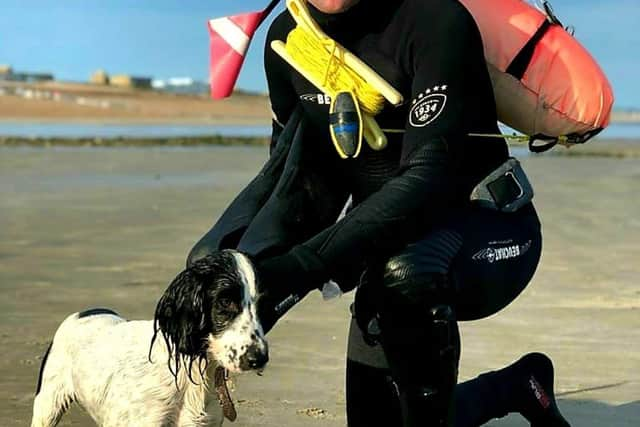Lifelong diver speaks out about importance of preserving coastal kelp beds
and live on Freeview channel 276
Steve Allnutt has been diving since he was a little boy. It’s been an important part of his life ever since his grandfather showed him the ropes at just 12-years-old. Now 39, all that time in the sea has given him a unique perspective on changes taking place beneath the surface.
“There’s been a massive change since I first started diving,” he said. “I started diving in Bognor in 1997 and, at the time you literally couldn’t go past a rock without seeing kelp sat over everything.
Advertisement
Hide AdAdvertisement
Hide Ad“By the year 2000, the tangleweed (one of two types of kelp Mr Allnutt reported seeing) had almost rotted on the rocks and died off. I don’t know what happened to it, but literally everything disappeared.”


Though he lives and works in Worthing, Mr Allnutt has been free-diving in Bognor Regis for well over a decade, and his observations are backed up by statistics from the Sussex Inshore Fisheries and Conservation Society, which suggest that, 95% of the kelp off the Sussex Coast had disappeared.
The Sussex Nearshore Trawling Byelaw, which passed in March this year, means that could be set to change. It effectively bans inshore trawling along the coast from Chichester to Brighton, giving the kelp beds- which play an important role in maritime ecosystems- a chance to recover.
Mr Allnutt said he has already seen an improvement in the proliferation of kelp beds.
Advertisement
Hide AdAdvertisement
Hide Ad“The kelp has spread so much on Bognor reef, and in some places I’d say it looks better than it did 20 years ago,” he said.
“It just goes to show that life can come back and Kelp can return.”
But there’s still a ways to go. Another threat to the sanctity of the marine wildlife Mr Allnutt loves to explore is water releases, which have been increasingly common over the last few months.
Southern Water, which was fined £90 million for pumping sewage into the North Hampshire coast earlier this year, said its releases are screened and pass through long sea outfalls before being released, but Mr Allnutt said they can have a profound affect on the seabeds.
Advertisement
Hide AdAdvertisement
Hide Ad“When they dump sediment into water from cleaning up harbours or marinas, that sediment will just clog up an entire inshore reef.”
“It’s like pouring soil onto a garden, you chuck too much on and it chokes everything up. And obviously, in that sediment, it’s not just sediment, it’s mud and everything else.”
That’s part of why Mr Allnutt has taken to social media to share his undersea findings. He hopes that, by sharing his photos and videos with a growing audience of followers, he can raise awareness of the need to protect these undersea ecosystems in a way big organisations simply can’t.
“I’ve spoken to a lot of big bods (about this) and the problem is they don’t have any experience and there’s so much health and safety, so they can’t go out and film, and they don’t know the places that I’ve built up experience with over all those years of diving. They can’t reproduce the really good, hard evidence of what I’ve seen over all those years.
Advertisement
Hide AdAdvertisement
Hide Ad“In a way, it’s quite nice for me because I’ve got such a nice little niche to demonstrate things.”
With nearly a thousand followers on Instagram and his videos played at an environmental conference in Hastings, Mr Allnutt is already making a splash and hopes to do more.
Read more
Under the sea- discovering the work to protect Sussex’s kelpPhotos courtesy of Steve Allnutt.